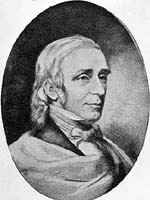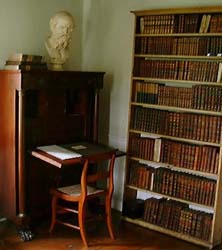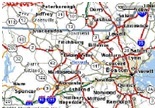|
American Transcendentalism: An Online Travel Guide Journals
Poetry
Special
Presentations Syllabus
WebQuests
Links &
References About This Site
|
|
|
Before
you visit Fruitlands, explore the life and work of Bronson
Alcott. Prior to founding Fruitlands, Alcott was an educator. Read
Elizabeth Palmer Peabody’s Record of Mr. Alcott’s school, exemplifying the principles
and methods of moral culture, to get his assistant’s first-hand view
of his pedagogy. Bronson Alcott truly inspired our class. Read
Tiffany’s thoughts on this educator, and then be
sure to look at Cat’s reflections as well. Alcott’s
role as father evidences his passion for education. Read about the
interaction between Alcott and his literary daughter, Louisa May. Linda
has something to say about Alcott’s daughter, Louisa May Alcott. Left: A. Bronson Alcott (permission pending from Orchard House). |
|
|
Visitors to Fruitlands can get a sense of the site by looking at this Historic American Building Survey map and description of the famed community. The farmhouse has been preserved by the Fruitlands Museum. Read about the history of and philosophy behind Fruitlands. Louisa May Alcott documented her life as a young girl at Fruitlands in her fictional piece “Transcendental Wild Oats.” (And don't forget to visit Orchard House in nearby Concord: that's where Louisa May wrote Little Women.) Fruitlands was just one of the Transcendentalist utopian communities. Brook Farm was another communal living experiment based on the Transcendentalist philosophy. Nathaniel Hawthorne memorialized this experiment in his novel, The Blithedale Romance. Visit the Brook Farm website to learn more – and if you’re in the area, stop by the Brook Farm Historic Site. Watch this video clip which discusses Hawthorne’s experiences at Brook Farm. (Once you've loaded the clip, go to 1:26.13 and watch until 1:29.19.) Left: The Study at Fruitlands. (Image courtesy of Fruitlands Museum, Harvard, MA). |
|
|
Not all
of the communal living experiments in the nineteenth century were led by the
Transcendentalists. Learn about communal living experiments in nineteenth-century
America. Consider
what it means to live in an intentional community today. Twin Oaks is an
intentional community that was established during the communal living
movement of the 1960s. Explore its origins, values, and philosophy. Left: Harvard, Massachusetts (in relation to Boston, Massachusetts) (courtesy of www.mapquest.com). |
|
This page was created by Catherine Hall, an English
Education major at Shepherd College. |
“American Transcendentalism: An Online
Travel Guide” was produced by students in ENGL 446, American
Transcendentalism, and ENGL 447, American Literature and the Prominence of
Place: A Travel Practicum. These courses were team-taught in the Department of English at Shepherd College (now
Shepherd University), Shepherdstown, West Virginia, in Spring
2002 by Dr. Patricia Dwyer and Dr. Linda Tate. For more information on the course and the
web project, visit “About This Site.”
© 2003 Linda Tate.



